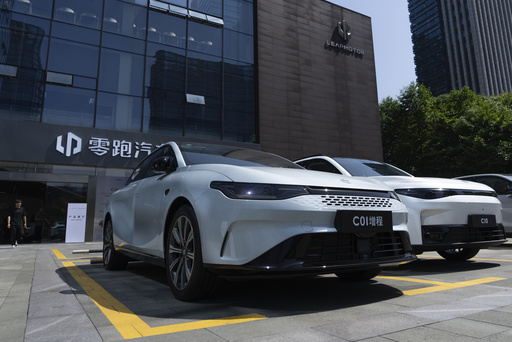BANGKOK (AP) — China and the European Union are open to holding talks on the EU’s recent decision to sharply raise tariffs on imports of Chinese-made electric vehicles, officials from both sides say.
China’s Commerce Ministry and Germany’s economy minister said over the weekend that each side was willing to hold talks on the issue. Meanwhile, Chinese state media said Monday that Beijing is pushing for the EU to give up plans to sharply raise provisional tariffs on imports of Chinese-made electric vehicles by July 4.
Escalating a trade dispute over Beijing’s subsidies that Brussels worries are hurting European automakers, the EU plans to impose provisional tariffs of 17.4% to 38.1% on EVs from China for four months starting on July 4. That’s on top of the 10% dutues for all imported EVs. They would apply to vehicles exported to Europe by both Chinese and foreign brands, including Tesla.
The European Commission, the EU’s executive arm, said preliminary results from an investigation into Chinese EV subsidies showed the country’s battery electric vehicle “value chain” benefits from “unfair subsidization” that hurts EU rivals.
Commerce Minister Wang Wentao held a video conference with European Commission Executive Vice President and Trade Commissioner Valdis Dombrovskis, the Chinese Commerce Ministry said in a notice Saturday on its website.
“The two sides agreed to launch consultations on the EU’s anti-subsidy investigation into Chinese electric vehicles,” it said.
“The doors are open for discussions. And I hope that this message was heard,” Germany’s economy and vice chancellor, Robert Habeck, said Sunday while on a visit to China.
In Berlin, German Chancellor Olaf Scholz said he had pushed hard for the EU to offer China further talks when it made its decision on the tariffs.
“There’s still a bit of time until July 4,” Scholz said in a speech to the main industry lobby group in Germany, which has Europe’s biggest economy. “But it’s clear, of course, that we will also need serious movement and progress from the Chinese side.”
“It’s important that the EU takes its opportunity until the end of the month, but also that the Chinese government takes its opportunity to bring about an agreement,” he said.
“It’s not a small issue for us,” Scholz added, pointing to Germany’s export strength and its auto sales to China. “Our industry is confident in global competition; that’s perhaps the difference between the German business and industrial model and some others, where protectionist measures generate more enthusiasm.”
China’s Commerce Ministry on Thursday accused the EU of making unreasonable demands in its investigation into imports of Chinese electric vehicles before it announced it was raising tariffs by as much as 38%.
Ministry spokesman He Yadong said the European side had demanded excessive amounts of information from Chinese automakers and then unfairly accused the Chinese companies of failing to cooperate.
Beijing said last week that it was opening an anti-dumping investigation into pork exports from Europe. In announcing that, the Commerce Ministry did not mention EV tariffs. But the investigation into various pork products was widely seen as a response to the EU measures on electric cars.
The European side has said it wants to discuss the findings of its investigation with Chinese authorities to find ways to resolve the issues.
___
Associated Press writer Geir Moulson in Berlin contributed to this report.



